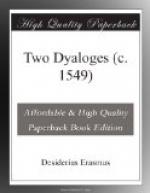the thinge? Boni. Methynke thy do. Bea.
Yf we had a logician here whiche could well and
clarkelie defyne what were a kynge, what a bysshoppe,
||what a magistrate, what a philosopher is, padueture
we shuld find som amog these iolly felowes whiche
had rather haue the name then the thynge. Boni.
Surely & so thynke I. Yf he be a kinge whiche by
lawe and equyte regardes more the commoditie of
his people then his owne lucre/yf he be a bisshop
which alwayes is careful for the lordes flocke comytted
to his pastorall charge/yf he be a magistrate which
frankelie and of good wyll dothe make prouysyon,
and dothe all thinge for the comyn welthes sake/and
yf he be a phylosopher whiche passynge not vpon
the goodes of this worlde, only geueth hym selfe
to attayn to a good mynde, and to leade a vertuous
lyfe. Bea. Lo thus ye may perseyue what a
nombre of semblable exaples ye may collecte & gether.
Boni. Undouted a great sorte. Bea.
But I pray the tel me wyll you saye that all these
are no men. Boni. Nay I feare rather lest
in so sayenge it shulde cost vs our lyues, and ||so
myght we our selues shortelye be no men. Bea.
Yf man be a resonable creature, howe ferre dyffers
this from all good reason, that in comodities apertayning
to the body (for so they deserue rather to be called
then goodnes) and in outwarde gyftes whiche dame
fortune geues and takes awaye at her pleasure, we
had rather haue the thynge then the name, and in
the true and only goodnes of the mynd we passe more
vpon the name then the thynge. Boni. So god
helpe me it is a corrupte and a preposterours iudgement,
yf a man marke and consyder it wel. Bea.
The selfe same reason is in contrarie thinges. Boni.
I wolde gladly knowe what ye meane by that. Bea.
We maye iudge lykewyse the same of the names of
thynges to be eschued, and incommodites which was
spoken of thynges to be diffyred and comodites.
Boni. Nowe I haue considered the thynges
well, it apereth to be euen so as ye saye in dede.
__Bea.__ It shulde be ||more feared of a good prynce
to be a tyraunt in dede then to haue the name of
a tyraunt. And yf an euyll bysshop be a thefe
and a robber, then we shulde not so greatly abhorre
and hate the name as the thynge. Boni. Eyther
so it is or so it shuld be. Bea. Nowe gather
you of the rest as I haue done of the prynce & the
bysshop. Boni. Me thynkes I vnderstande this
gere wonderouse well. Bea. Do not all men
hate the name of a fole or to be called a moome,
a sotte, or an asse? Boni. Yeas as moche
as they do any one thynge. Bea. And how saye
you were not he a starke fole that wold fishe with
a golde bayte, that wolde preferre or esteme glasse
better then precious stones, or whiche loues his
horse or dogges better then his wyfe and his chyldre?
Boni. He were as wyse as waltoms calfe, or
madder then iacke of Redyng. Bea. And be not
they as wyse whiche not assygned, chosen, nor yet




